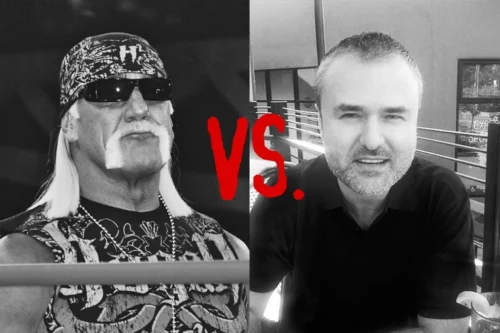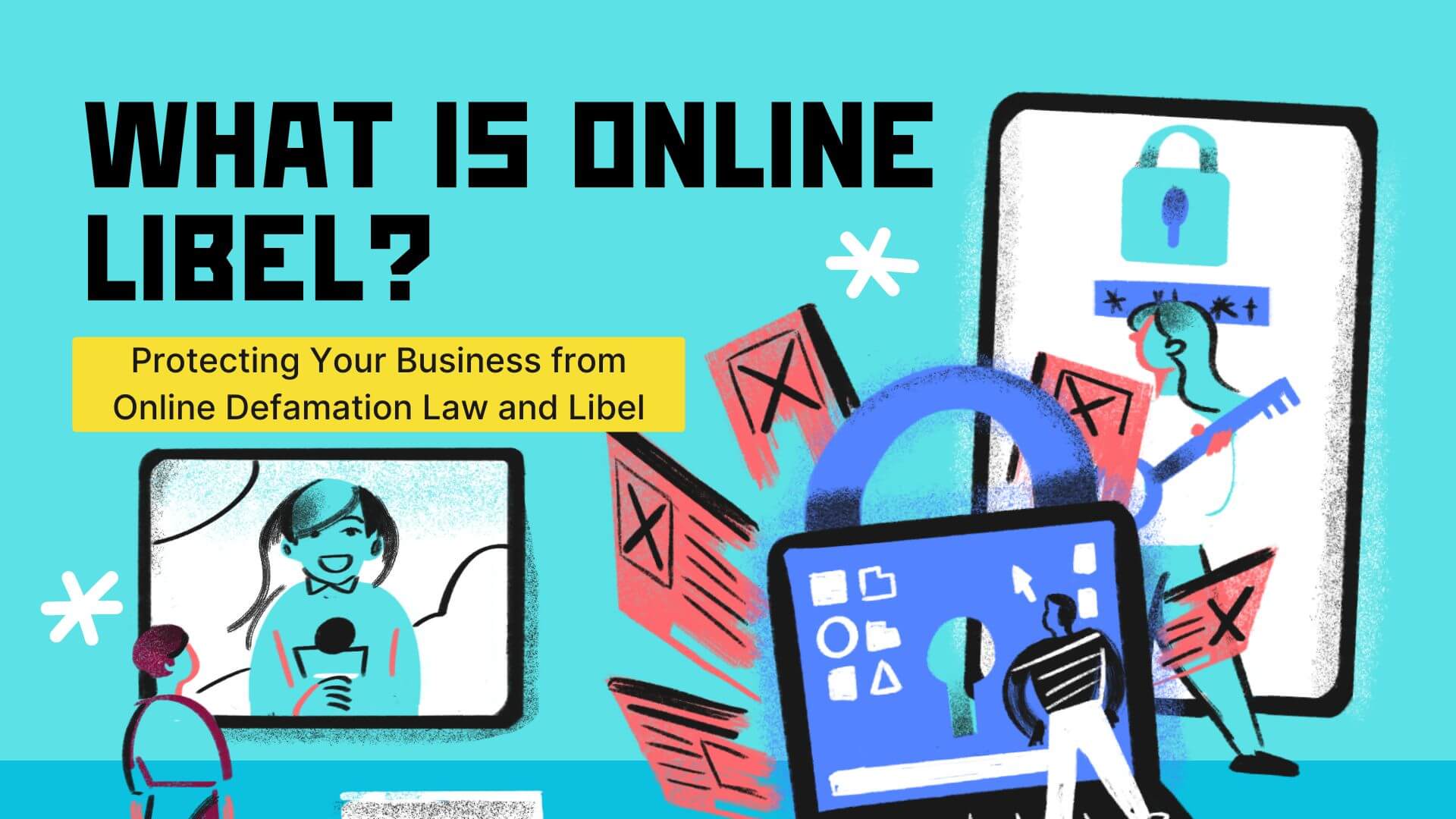What is Online Libel? Protecting Your Business from Online Defamation Law and Libel
Online reputation (OR), in the most simplest terms, is your business’ image as perceived by others, mostly by your potential clients, based on what they read, hear, or see online. This perception is majorly shaped by everything ranging from customer reviews, blogs, social media posts, feeds, stories, and comments uploaded on public forums.
As you may know, if you’re a regular reader of Prosperly blogs, for most small and local businesses, Google reviews is the primary source of this online reputation, other than platforms like Yelp (if you are part of the service industry) and Facebook.
In a nutshell, the OR of any business is its digital footprint—the impression conceived in mind when someone hears of a brand name. It has the capacity to impact your business revenue and customer volume more than anything else.
That’s why you can witness companies investing loads of their money into getting good reviews or signing up with platforms like Prosperly to help them get positive Google reviews.
But here is the question: what can you, a business owner, do when someone tries to hurt your business interests by leaving malicious fake reviews?
Is deleting and reporting such reviews your only way out? Can you take the legal route? Are there any legal precedents in case of fake online reviews that you can look up to get hope for your case?
Today’s blog is all about covering these topics in-depth. So let’s get started.
Legal Vulnerabilities in Online Reputation: Deeper Understanding of What is Defamation and What is Online Libel
No matter how good you think your service or product is, you are bound to get some negative reviews every now and then. People are entitled to their opinions.
The trouble starts when people pass their opinions as facts, and online defamation occurs, even when it comes at the cost of your business’s reputation.
That’s when things can get tricky and “legally”.
See, negative reviews, on their own, are neither illegal, unethical, or immoral, or even covered by internet defamation or cyber law. A customer from the past might say something like “Their home delivery was a bit too slow for my taste” or “The food was not what I had thought”.
In both cases, the reviews reflect the personal experience of the customer and no matter what you feel, they can’t be challenged or appealed against.
However, let’s say someone accuses you of serving expired food or overcharging using hidden costs or something on that line, that’s often termed as defamation – given they can back their claims or you can back yours.
When someone defames you with words, that’s slander. Like, if some guy stands or goes from one person to the other and keeps spewing out factually incorrect statements, he is said to be slandering your name.
If the same slander is done in writing by publishing those statements in the public domain, that’s defamation or cyber libel.
A quick example to drive the point of home. Say, you post a review that your local dentist botched up your dental cleaning, even when the whole procedure went well, just to get back at him because of his invoice, is libel.
From a legal point of view, for a statement to be legally considered defamation, it should fulfill the following three criteria:
- False Statement: The statement must be factually incorrect (if you have proof for that then it certainly helps)
- Online Publication: The statement must be communicated to someone other than the person it concerns (like a review, discussion in a group, publishing it on a blog, etc.)
- Reputation Damage: The false statement must cause damage to the individual or business’s reputation.
Few Examples to Understand Slander and Libel
There have been enough eye-grabbing and news-making events in our world that help us understand what makes for slander/libel, in turn leading to defamation.
In almost all of these traditional defamation cases, one party draws the first blood by accusing the other party of some kind of foul play. In return, the other party dismisses such acquisitions and then slaps the former with a lawsuit.
Let’s have a look at a few of the most high-profile cases of defamation.
Johnny Depp vs. Amber Heard (Libel)
In 2020, the Pirates of Caribbean fame Johnny Depp sued The Sun, a UK tabloid. This was done in retaliation to The Sun’s publishing an article that labeled Depp a “wife-beater” following allegations made by his ex-wife, actress Amber Heard. Depp and his legal team claimed that the accusations were false and that the article caused significant damage to his reputation.

Eventually, Depp lost the libel case in the UK as the court concluded that The Sun had enough evidence to prove that the article’s claims were “substantially true.” Despite this, Depp’s legal team later filed a defamation case against Heard in the U.S. Depp finally won and the case got enough media attention to bring the plight of abused men in light, restoring his reputation, and the jury awarded him damages.
- Why This is Libel: The false claims were written and published by a major news outlet, damaging Depp’s reputation in a public forum. This is a classic case of libel where defamatory statements are made in a published article.
Cardi B vs. Tasha K (Libel)
Back in 2022, US rapper Cardi B won a libel lawsuit against a YouTuber named Tasha K. Cardi accused Tasha of spreading false information about her on her channel.On the other hand, Tasha claimed that Cardi B had engaged in criminal activities, drug abuse, and had a sexually transmitted disease, none of which were true.

Cardi B eventually won the case. Tasha was ordered by the court to pay millions in damages for the false claims she made. The jury was of the opinion that the YouTuber had knowingly spread lies, resulting in significant harm to Cardi B’s reputation.
- Why This is Libel: The false statements were made in videos and written posts on social media platforms, which were considered published defamatory statements. This case is a clear example of libel in the age of digital media.
Elon Musk vs. Vernon Unsworth (Slander)
It’s not easy to win when you’re up against the legal team of one of the richest men in the history of our world. So, back in 2018, Elon Musk, the CEO of Tesla, called British cave diver Vernon Unsworth a “pedo guy” on Twitter after Unsworth criticized Mus k’s involvement in the Thai cave rescue. Musk’s tweet implied that Unsworth was a pedophile, a highly damaging accusation.

Unsworth then sued Musk for slander. However, Musk still won after his legal team argued that the term “pedo guy” was meant only as an insult and wasn’t a factual accusation. The court then ruled that the tweet by Elon did not meet the legal threshold for defamation.
- Why This is Slander: Though the derogatory term was “published’, the statement was spoken (via a tweet, which is still considered public verbal communication), but Musk successfully argued that it was a hyperbolic insult rather than a factual claim.
Rebel Wilson vs. Bauer Media (Libel)
Who doesn’t know Rebel? Among her many gigs, the movie Pitch Perfect was the one that helped her crack onto the movie scene. But after the much deserved fame, the Australian actress sued Bauer Media, the publisher of Women’s Day magazine for several articles that accused Rebel of lying about her actual age, name, and background.

Wilson, in return fire, claimed that the articles published by Women’s Day were false and damaged her career, causing her to lose job opportunities in Hollywood. The court found that Bauer Media had defamed her by publishing false information about her life and career. Wilson initially won the case, receiving millions in damages. However, the number was reduced on appeal.
Sarah Palin vs. The New York Times (Libel)
Former Alaskan governor and vice-presidential Republican candidate Sarah Palin sued The New York Times in 2017 for libel. She alleged that an editorial published in the newspaper linked her political actions had incited violence, harming her reputation.

The court where the case was being argued dismissed Palin’s lawsuit. It ruled that Palin failed to prove the NYT had acted with “actual malice.” The judge determined that while the article was inaccurate, it was not published with the intent to defame.
- Why This is Libel: Palin accused The New York Times of publishing false statements that could damage her public image. Even though the court dismissed her case, this situation highlights the legal standards required for public figures to prove libel, particularly the need to demonstrate malice.
Hulk Hogan vs. Gawker (Libel)
In 2016, now retired and former WWF (now WWE) professional wrestler Hulk Hogan (real name Terry Bollea) sued Gawker, a gossip site, for publishing a secretly filmed video of him performing coitus with a friend’s wife. Hogan claimed the publication of the video invaded his privacy and damaged his reputation.

Hogan went on to win the case as the jury awarded him $140 million in damages. The settlement amount was too much for the publication to take, forcing Gawker to shut shop.
- Why This is Libel: Although the case initially involved issues of privacy invasion, it also touched on defamation because Gawker published a story that caused significant reputational harm to Hogan. This is an example of how libel can intersect with privacy law.
Katie Holmes vs. Star Magazine (Libel)
Actress Katie Holmes (Dawson’s Creek, Batman Begins) sued Star magazine in 2011. The magazine ran a story whose headline insinuated she had a drug addiction. The story had no factual basis. Holmes argued that the story was both defamatory and damaging to her image.

A settlement took place for an undisclosed amount. The Star magazine also had to publicly apologize, admitting that the claims were baseless, eventually retracting the article.
- Why This is Libel: The magazine’s false and defamatory claims about Holmes’ alleged drug use were published in print, causing reputational harm. This is a clear case of libel, as the story was presented as fact and not mere opinion.
Making the Right Choice: When to Sue and When to Woo
Lookie, dear reader! If we go online searching for the precedents when the jury or judge ruled in favor of those who were defamed, we might get enough examples to stroke our egos. Even examples to make us believe that we, too, can take down the malingers and restore our lost reputation.
But before you get all pumped and start looking for online defamation lawyer that are good at filing and winning defamation lawsuits, you must ask yourself one serious question: how am I going to come out of it in the end?
We are not talking about you winning or losing – although the former sounds better if it happens to you. Think about all the time and energy you are going to put into this lawsuit. And let’s be honest here. Unless your whole scene looks like Hulk Hogan’s one, every day in the court would make you wish you never started all of this in the first place.
That’s because celebrities are not alone. They are an industry in themselves. They have got teams working day and night for every single aspect of their lawsuit. And if you’re a business owner who felt so intimidated by a single Google review that you decided to pursue the legal angle, chances are you don’t have so many legal people at your disposal.
So, unless you have so many lawyers in your pocket as them, it’s better to let your ORM team do the damage control. For the cases that things get too personal or too damaging to reputation, you may choose to take the legal route after an insightful counseling from a legal expert.
Handling Negative Reviews: Responding vs. Ignoring
We have already discovered this part in some of our previous blogs, though in bits and pieces. The idea remains and the path remains the same. You see someone accusing you or your business of some kind of malpractice in Google reviews, and you want to lash out.
But that’s not how it should work. As a business owner or someone handling the ORM manager for a business, you really don’t have the liberty to lose your call if someone posts something that your business interests don’t align with – even if it’s a fake review.
So, the first thing you should do is to separate criticism from a fake review. Let’s look at it step by step.
You start your day with cleaning your place of service. You flip the “Closed” sign to the other side. You welcome your first customer and your team writes down their first order and starts preparing it. Then you switch on your computer to check on the reviews, orders, or bookings you have received till you last checked.
Everything seems good until you see it. A review like “the coffee was cold” or “the wait time was longer than I had expected”. A simple customer simply expressing their dissatisfaction over a bad service.
Now, here is the thing. You have two ways to go from here. You can either choose to learn from this. This takes a more composed head, the skill to read between the lines, and then assigning responsibilities to ensure that it never happens again.
This starts with your making your staff read it and ask them where and when you guys went wrong. This goes a long way in improving your service quality.
The second option is you to feel “insulted” by it, flip over the table on top of which the computer is kept, and you turn into Captain Ahab and assume that the reviewer is now your “Moby Dick”. That’s not a very professional approach and isn’t going to end well for any and all involved. If a review is simply an honest criticism, you would do a lot well by learning from it.
Now, let’s say someone posts “They charged me 120 over the agreed price”. Now that’s a case of defamation, and as they have published it, will be further classified as libel. But, but, but. What if someone from your staff indeed charged them that high for a simple cup of coffee.
That could be the case, you know. There are employees who, at times, think that they are not being paid enough for the impressive work that they have been doing till now. They assume that they deserve to get a raise, a position hike, and god knows what else.
So, once they lose that argument with you, they decide to take things in their own hands. So before you start bad mouthing the reviewer, it’s best to get in touch with them. If the allegation indeed turns out to be nothing more than an attempt to defame you and your, these are your options from a legal point of view:
- Consult Legal Counsel: If the review contains false information or serious accusations, you may need to consult a lawyer – one who specializes in defamation suits. As you read above, even if something irks you in so many different ways, you have to provide facts and prove malice on the accuser’s part. That’s when the judge is going to rule in your favor.
- Document Everything: Screenshot reviews, blog posts, or social media comments that contain defamatory statements. This is crucial evidence in any legal proceedings. This is important, because if the defamer comes to know that you are going to be dragged to the law of court, they might end up deleting everything that they have done till now. So, document.
- Preserve Evidence: In addition to screenshots, keep records of any financial impact, such as a decrease in revenue, customer cancellations, or negative media coverage. This impact has to be timeline bound. Say, the comment that you allege to have defamed your business came on the 6th of the month, then the record of decline in bookings and sales numbers have to be after that day and not prior.
- Respond Professionally: While it’s important to defend your business, always respond professionally to any false online defamation claims. You don’t want the other court to note that you behaved as ugly as the other party. Maintain the decency in your replies no matter how low the reviews or criticism feel to your good sense.
- Cease and Desist Letters: This formal document warns the individual making defamatory statements to stop or face legal action. It’s a quick, cost-effective way to stop the spread of false information.
In more severe cases, filing a defamation lawsuit may be necessary to protect your business. If the defamatory statement has caused significant reputational or financial harm, you can pursue legal action for damages.
To win a defamation case, you must prove online defamation:
- The statement was false (this needs to be proved by producing relevant evidence)
- It was done with an intent to malign your brand’s or your name (simply calling you names won’t amount to much and can even be labeled “freedom of speech” unless you prove otherwise)
- It was published or communicated to a third party (screenshots and links to such stories can prove to be helpful)
- It caused harm to your business (as we discussed above)
Strategies for Protecting Your Business from Malicious Reviews
To protect your business from defamatory reviews, take a proactive approach:
Regular Monitoring
Set up Google Alerts for your business name and review sites so you can respond quickly to any new reviews. You can set aside some daily time to check all your Google reviews and reviews on other sites to ensure that you are not getting low stars or bad name anywhere by anyone.
This is one important step, you know. You would be surprised to know that even the top brands of the world simply lose steam because they don’t bother checking up bad reviews.
That’s why there are several online tools that alert you whenever your brand name is tagged anywhere on top social media platforms.
Engage with Customers
Show your customers that their feedback matters by responding to both positive and negative reviews, this much we have already discussed. So, remember, you need to keep it cool.
Don’t flip. Don’t go into your cocoon. Invite the reviewer for a healthy discussion to show that you care.
Leverage Prosperly
Prosperly offer tools to help businesses manage their online reputation by encouraging positive feedback and mitigating the impact of negative reviews. We do it by placing a kind of safety net that catches up the negative reviews before they appear on your Google My Business profile so you have the required time to deal with them.
Further, you can also automate your review requests after your service or product delivery is done, which in turn helps you in amassing positive Google reviews.
- Keep collecting positive Google reviews: This is important, you see. Let’s say you have around 100 reviews. So, maybe, 2-5% of negative reviews won’t amount to much. Even your potential customers expect some negative reviews, because that gives your ORM a much realistic look.
Because, as we all know, no matter how good a business or service is, everyone’s ORM is bound to take a hit in the form of a negative review.
That’s why it’s important that you keep collecting as many good ones as possible before that unfateful comment arrives on that unfateful day. Prosperly can certainly help you with this cause of yours by automating review requests.
You can also try this by talking with your happy clients and sending them a review request via emails, WhatsApp, SMS, etc..
Conclusion
In today’s digital world, maintaining a strong online reputation is crucial for long-term business success. With the right combination of proactive reputation management, legal safeguards, and tools like Prosperly, you can protect your business from defamatory attacks and thrive in the digital landscape.
Protecting your business from defamation and libel isn’t just about avoiding legal troubles—it’s about preserving the trust and loyalty of your customers. Take steps today to safeguard your reputation and build a stronger future for your business.


